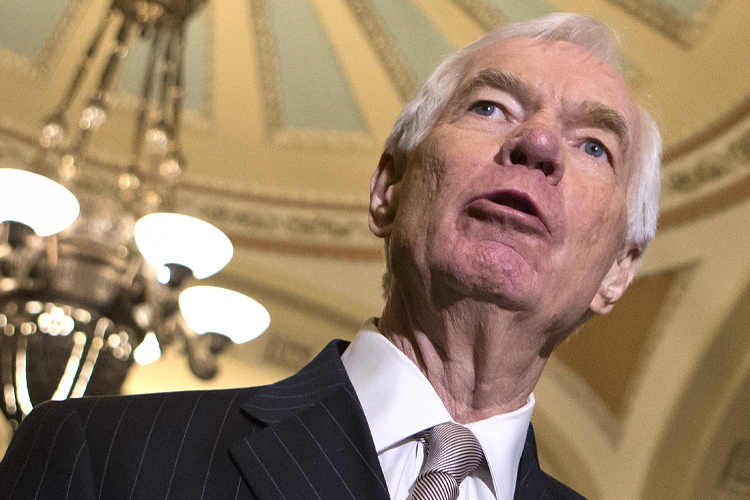The talk of the town in the bizarre Mississippi GOP Senate primary — which now, for what it’s worth, involves a character named James “Scooby Doo” Warren — is why Thad Cochran’s appeals to seniority and pork and his standing on the appropriations committee aren’t quite appealing enough. Mississippi receives the largest return on tax dollars sent to Washington, of all states, and it’s not unreasonable to suggest, as Cochran has been doing, that without him, procurement of said funds may prove to be more difficult. Especially when he has an opponent, in state Sen. Chris McDaniel, who actively rejects the sort of “spending” that Cochran does on behalf of the state.
“Spending.” It’s a powerful attack word in Republican politics. Washington does too much “spending,” therefore the people in Washington need to be ousted. That’s about all a Tea Party challenger needs to say and all a Tea Party voter needs to hear; further explanation of what this “spending” is need not be explained, because no one is listening.
We here at Salon have been nursing a little theory about why Cochran’s appeals to all the federal cash he brings home haven’t been working over the crowds. We’re afraid it’s more cynical than the Tea Party-preferred explanation that their values, and their virtuous, thrifty natures, prevent them from accepting this dirty money. Or that “crony capitalism” and the Export-Import Bank is really what grinds their gears about Washington. What if it’s just that they don’t think they’re getting any benefit from this money, and that whatever “spending” they’re seeing is just that from welfare bums? The New York Times offers some evidence to back up this theory in its latest dispatch from the state:
“Everybody’s got their hand out like these damn people at the food stamp office,” Mr. Harris, 67, said between sips of coffee on Thursday at a local barbecue restaurant. “They’ve got to put an end to all of this spending.” […]
Many voters seem less impressed. On Friday, Mike Thornton, 65, was browsing the wares at a hunting and fishing superstore called Sportsman’s Warehouse. Mr. Thornton, a land surveyor, said he could not really see what federal dollars had done for Mississippi, other than encourage lazy welfare recipients who were “working the system.” […]
“What’s wrong with this picture?” Mr. Harris, the auctioneer, said, when presented a list of projects that had benefited DeSoto County. “What if every state did that? And you wonder why we have this national debt.”
There’s an impression among a certain, not-insignificant strand of conservative voters, reinforced by opportunistic Tea Party politicians, that the entire federal budget breaks down like so: one-third goes to evil earmarks, like the Bridge to Nowhere. Another third goes to welfare for “lazy” people, such as those in the food stamp or free cellphone lines. The final third goes to foreign aid, which is perceived to be cartons and cartons of thick juicy steaks helicoptered in for the welfare bums of the third world. All “spending,” in this framework, is obviously terrible.
When the auctioneer interviewed in the Times piece is presented with a list of projects that he’d been unaware of and asks, “What if every state did that? And you wonder why we have this national debt,” he misses a couple of things. The first is that every state doesn’t do that to the extent that Mississippi does. And that’s fine! Because our beloved market economy has a tendency to skimp on investment in certain states. It’s perfectly fair for the representatives of states like Mississippi or Alaska to then secure more government funding to make up the difference.
The other thing he misses, along with a lot of people who equate “earmarks” with “spending,” is that earmarks are not fresh spending. Earmarking is a means of allocating existing appropriations. Instead of a department or agency determining how appropriations are spent, a certain, relatively small amount can be “earmarked” toward a lawmaker’s project. Earmarks aren’t a contributor to the national debt. Maybe a little corrupt. But if that corruption didn’t exist, well, Mississippi wouldn’t get much federal money.
Part of what’s happening in Mississippi is another example of “Get your government hands off my Medicare!”-style Tea Party stubbornness to accept that government “spending” can, and does, benefit one’s self, and not just Other People. They don’t see the highway funding or the air traffic control tower or the sewer system and know where the money for that comes from. All they see is the guy in line at the food stamp office.

